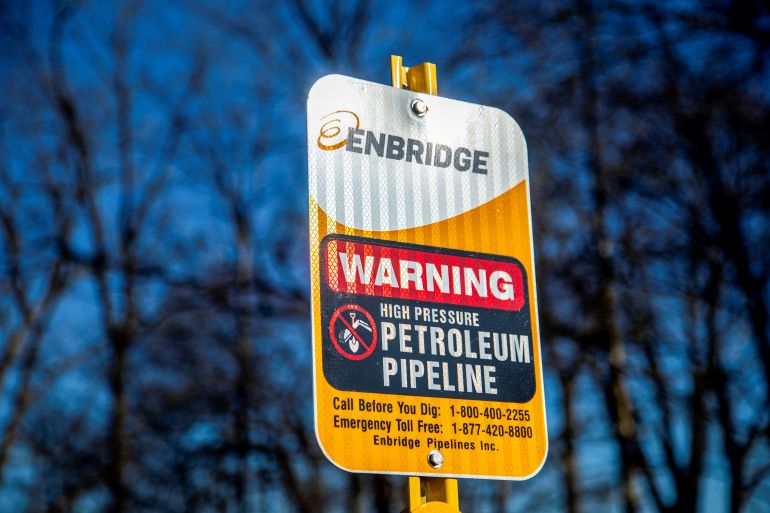Canada invokes treaty with US in dispute over Line 5 pipeline
Canada has been pushing the US to intervene in a dispute over a contentious oil pipeline project Michigan ordered shut.

Canada has formally invoked an international treaty with the United States over Enbridge Inc’s Line 5 pipeline, escalating a dispute over the contentious project slammed by environmental and Indigenous groups.
Line 5 ships 540,000 barrels per day of crude and refined products from Superior, Wisconsin, to Sarnia, Ontario, but the state of Michigan ordered Enbridge to shut it down due to worries a leak could develop in a section running beneath the Straits of Mackinac in the Great Lakes.
Keep reading
list of 3 itemsCompany drops contentious Keystone XL pipeline project
‘Reclaiming the land’: Indigenous fight against Line 3 ramps up
Enbridge ignored Michigan’s order and the sides are embroiled in a legal battle, while Ottawa has been pushing its counterparts in the US to intervene.
In a statement on Monday, Canadian Foreign Affairs Minister Marc Garneau said Canada had invoked the dispute settlement provisions of a 1977 treaty with the US that “guarantees the uninterrupted transit of light crude oil and natural gas liquids between the two countries”.
This is the first time the treaty has been invoked.
My statement on Line 5 transit pipeline: https://t.co/mjw9eqi131 pic.twitter.com/CY5FkltybR
— Marc Garneau (@MarcGarneau) October 4, 2021
“In response to Michigan’s efforts to shut down Line 5, Canada has raised its significance for Canadian economic and energy security at the highest levels of the U.S. federal government,” Garneau said.
“We have also stressed the importance of fully respecting and implementing the international agreements that are in place between our two countries.”
The announcement was slammed by environmental group 350 Canada, which said it demonstrates “the lengths our government will go to prop up the fossil fuel industry, when they could be throwing down behind a just transition that puts people, our planet, and workers first”.
Article Six is the process used by the 1977 treaty to resolve disputes.
In a letter to the US federal judge overseeing the case between Enbridge and Michigan, Gordon Giffin, legal counsel for the Canadian government, asked the court to halt any proceedings related to Michigan’s Line 5 shutdown order while the Article Six process is ongoing.
That was criticised by Sean McBrearty, co-ordinator for environmentalists Oil & Water Don’t Mix.
“The government of Canada took an action today that ignores the risk of an oil spill in the Great Lakes and seems clearly designed to delay a legal decision to shut down Enbridge’s twin Line 5 oil pipeline in the Straits of Mackinac,” McBrearty told Reuters.

Michigan leaders have also argued that the pipeline poses a threat to the Great Lakes, which surround the US state and contain about 20 percent of the world’s fresh water supplies.
On Monday, Michigan Attorney General Dana Nessel dismissed the Canadian government’s letter to the court.
“I am disappointed that the Government of Canada continues to align itself with Enbridge’s desire to keep using State-owned lands to pump oil through the heart of the Great Lakes, threatening our most precious public resources,” Nessel said in a statement.
The US State Department did not immediately respond to requests for comment from the Reuters news agency on Monday.
Indigenous groups have also raised serious concerns about Line 5, saying a spill could endanger freshwater supplies for millions of people in the Great Lakes area, as well as harm local wildlife and marine species.
In May, the Anishinabek Nation said it was “disappointed” the Canadian government was opposed to Michigan’s closure of the pipeline.
“It is upsetting to see that the Government of Canada will pick and choose which treaties to uphold based on convenience and profit, rather than in good faith for the health, safety, and well-being of all inhabitants of these lands,” Anishinabek Nation Grand Council Chief Glen Hare said in a statement at that time.
“The Government of Canada is not upholding the treaties made with the First Nations, but will uphold the 1977 treaty for Pipelines.”
Monday’s announcement was welcomed by Canada’s Building Trades Unions, which represents more than 500,000 construction workers.
Ensuring Line 5 continues to operate will “protect thousands of jobs on both sides of the border”, the group’s executive director, Sean Strickland, said in a statement. “Cancelling the easement for Line 5 will not only threaten our energy security and drive consumer prices through the roof, it will cost thousands of workers their livelihood.”
Ontario Premier Doug Ford also said he backed Ottawa’s decision. “Line 5 is a vital source of energy for Ontario that generates thousands of good-paying jobs. We support the federal government taking this important step,” Ford tweeted.